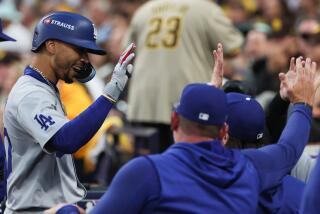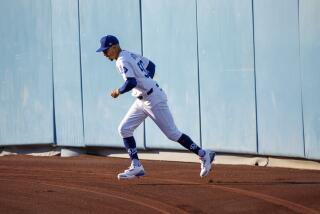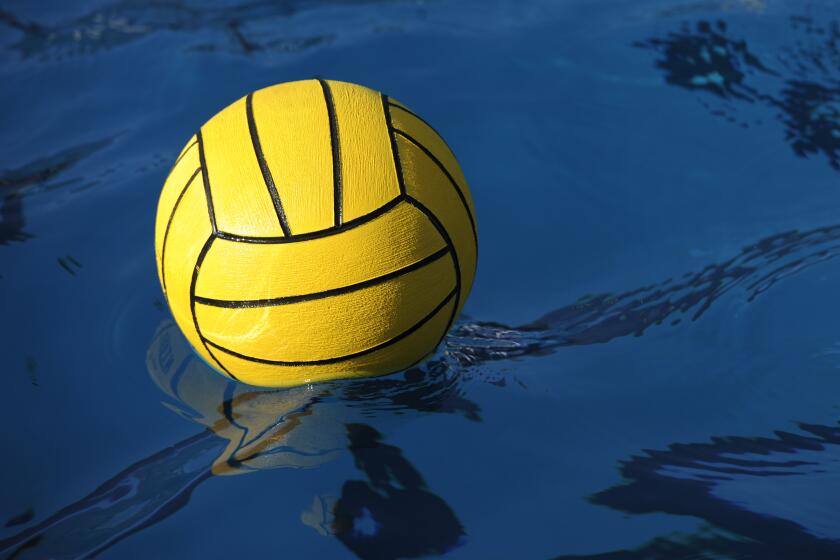Dodgers pitcher Josh Beckett has changed it up and toned it down
PHOENIX — Gunslingers don’t smile, they scowl.
Yet, there was Dodgers pitcher Josh Beckett standing in front of his spring training locker, his face creased with a grin. Baseball’s version of Billy the Kid had become a warm and fuzzy pacifist.
“I think we all go through that transition at some point,” said Beckett, once a cocky, hard-throwing intimidator but now a wizened, wily veteran.
“When your stuff changes you have to react to it. There’s nothing you can do. You have to make adjustments.”
Such subtlety was something Beckett had little use for when he came out of south Texas 14 years ago, the second player — behind Josh Hamilton — selected in the 1999 draft. He was not lacking for confidence, answering to the nickname “Kid Heat” and stitching the word “Phenom” into his letterman’s jacket. In his first major league news conference, the high school senior predicted he would be pitching in the All-Star game two seasons later.
He also had the talent to back some of that up, capping his second full season by throwing the first two complete games and first two shutouts of his career in the postseason, blanking the New York Yankees in Game 6 and winning the World Series MVP award for the then-Florida Marlins.
That Beckett is largely gone now, and so is that high-velocity fastball.
At 32, he has matured, using “we” far more than “I” or “me” when he speaks. And on the mound he has mellowed, using curveballs, changeups and cutters far more than his fastball. It’s a transformation befitting a guy who figures to be the oldest member of a young Dodgers rotation anchored by two former Cy Young Award winners, Clayton Kershaw and Zack Greinke.
“He was Greinke and he was Clayton,” Dodgers Manager Don Mattingly said of Beckett. “So this guy knows how to pitch and what he’s doing. We’re not talking about some guy who’s searching for his identity. He knows how to pitch.”
Even while still learning how to pitch differently.
Early in his career, when he won World Series championships with the Marlins and Boston Red Sox, Beckett would announce his presence with authority, once buzzing a fastball under Sammy Sosa’s chin in a playoff game and another time throwing a pitch over Bobby Abreu’s head after the Angels outfielder stepped out of the batter’s box.
His fastball hummed along in the mid-90s then, and he threw it more than 70% of the time.
By last season, the velocity had dropped to 91 mph and Beckett, for the first time in his career, threw his fastball less than half the time.
“I definitely wish I could still throw that hard,” he says. “But you’ve got to change.”
Mattingly said Beckett is simply doing what he needed to do to remain a productive big league pitcher.
“His stuff may not be the same dominant-type stuff. But again, what’s he doing? Making adjustments,” Mattingly said. “His changeup is getting better. That’s what pitchers do that really know what they’re doing. They’ll keep changing speeds, whatever they have to do.”
Beckett hasn’t allowed a run this spring, throwing eight shutout innings — including four in a minor league camp game — with nine strikeouts and one walk. Opponents are hitting .152 against him.
That comes on the heels of Beckett’s worst season, one in which he had a combined 7-14 record and 4.65 earned-run average for the Red Sox and Dodgers. But rather than surrender, Beckett looked at those numbers as a challenge.
“Having a year that wasn’t up to his standards, I think he’s got something to prove,” Dodgers pitching coach Rick Honeycutt said. “I’m not so sure he’s reinventing himself as much as [his] health is helping him do more of what he can do.”
Getting out of Boston helped. After averaging 16 wins a season in his first four years with the Red Sox, Beckett struggled through an injury-plagued 2010 season in which he had a 6-6 record and career-high 5.78 ERA.
And though he bounced back to go 13-7 with a 2.89 ERA the next summer, Boston’s demanding fans began to turn on him, and the season ended poorly when reports surfaced that he and two other Boston pitchers drank beer and ate chicken in the clubhouse during games they didn’t pitch
Five months into last season, Boston sent Beckett to the Dodgers as part of the nine-player deal that also brought Adrian Gonzalez and Carl Crawford to Los Angeles.
Reinvigorated, the right-hander posted a 2.93 ERA in seven starts with the Dodgers. And he’s continued his transformation this spring, working with special advisor Sandy Koufax on his delivery and turning to his curve and changeup more than a fastball that has lost much of its punch.
There have been other changes too. Beckett, once linked romantically with model Leeann Tweeden and country singer Danielle Peck, settled down two years ago and married Holly Fisher, an aeronautical engineer — yes, she’s a rocket scientist — and former high school classmate.
Seventeen months ago, the couple welcomed their first child; they’re expecting another in August.
“I couldn’t be happier,” Beckett said. “I don’t want this to happen, but if somebody came up to me tomorrow and said, ‘Hey you can’t do this anymore,’ I’d be like ‘that sucks.’ But you know what? I have to take it on the chin and move on.
“I’ve done some pretty cool things in my career. I’m just kind of at peace with that. Is there more to do? Yeah. I’d love to win a World Series with an L.A. on it. And I think we’ve got a good chance to do that. We’ve just got to keep doing what we’ve been doing.”
Even if, as in the case of Beckett, you change the way you’ve been doing it.
twitter.com/kbaxter11
More to Read
Go beyond the scoreboard
Get the latest on L.A.'s teams in the daily Sports Report newsletter.
You may occasionally receive promotional content from the Los Angeles Times.











